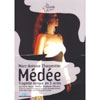Charpentier, M-A Médée
A concert performance on film – even if it’s good – what’s the point?
View record and artist detailsRecord and Artist Details
Composer or Director: Marc-Antoine Charpentier
Genre:
DVD
Label: Armide Classics
Magazine Review Date: 3/2006
Media Format: Digital Versatile Disc
Media Runtime: 150
Mastering:
Stereo
Catalogue Number: ARM002

Tracks:
| Composition | Artist Credit |
|---|---|
| Médée |
Marc-Antoine Charpentier, Composer
(Le) Concert Spirituel Orchestra (Les) Chantres du Centre de Musique Baroque de Versailles Bertrand Chuberre, Oronte, Bass-baritone Caroline Mutel, Nérine François-Nicolas Geslot, Jason, Countertenor Gaëlle Méchaly, Créuese, Soprano Hervé Niquet, Conductor Marc-Antoine Charpentier, Composer Renaud Delaigue, Creon, Bass Stéphanie d' Oustrac, Medée, Soprano |
Author: Richard Lawrence
Hard on the heels of Lully’s Persée from Toronto (9/05) comes another 17th-century French opera conducted by Hervé Niquet, recorded in the theatre at Versailles with Niquet’s own band, Le Concert Spirituel. This time it is a concert performance, though Olivier Simonnet is credited with the ‘mise en espace’: characters come and go, there is gesture and facial expression, but that’s about all.
Médée is Charpentier’s dramatic masterpiece, composed in 1693 to a libretto by Thomas Corneille, younger brother of Pierre. It’s a full-blown five-act tragedy after the manner of Lully, with a prologue in praise of Louis XIV in which, unusually, the King is actually named. Sadly, the prologue is omitted here, as is a chunk of the divertissement in Act 2, where Charpentier, pupil of Carissimi, set verses in Italian; and – another deficiency – nowhere in booklet or on film does it say who is singing which part.
The story is about Medea’s revenge on her lover Jason, who intends to leave her for Creusa, daughter of Creon, the king of Corinth. Medea uses her magical powers to murder Creusa with a poisoned robe, having first sent her father mad. In a final confrontation with Jason, she tells him that she has killed their children and then flies away on a dragon.
Despite these horrors, one’s sympathy lies with Medea, and Stéphanie d’Oustrac is eloquent in despair and vigorous in anger. Jason is weak: ‘Que je serais heureux, si j’étais moins aimé!’ he exclaims, in what I suppose is another version of ‘How happy could I be with either…’. François-Nicolas Geslot puts across this unappealing character very well. Gaëlle Méchaly is a rather acid-toned Creusa, Renaud Delaigue a good, firm Creon. The orchestra is excellent.
But I don’t really see the point of filming opera in concert; there’s more drama in William Christie’s CD set on Erato (6/95), with Lorraine Hunt Lieberson a truly magnificent Medea.
Médée is Charpentier’s dramatic masterpiece, composed in 1693 to a libretto by Thomas Corneille, younger brother of Pierre. It’s a full-blown five-act tragedy after the manner of Lully, with a prologue in praise of Louis XIV in which, unusually, the King is actually named. Sadly, the prologue is omitted here, as is a chunk of the divertissement in Act 2, where Charpentier, pupil of Carissimi, set verses in Italian; and – another deficiency – nowhere in booklet or on film does it say who is singing which part.
The story is about Medea’s revenge on her lover Jason, who intends to leave her for Creusa, daughter of Creon, the king of Corinth. Medea uses her magical powers to murder Creusa with a poisoned robe, having first sent her father mad. In a final confrontation with Jason, she tells him that she has killed their children and then flies away on a dragon.
Despite these horrors, one’s sympathy lies with Medea, and Stéphanie d’Oustrac is eloquent in despair and vigorous in anger. Jason is weak: ‘Que je serais heureux, si j’étais moins aimé!’ he exclaims, in what I suppose is another version of ‘How happy could I be with either…’. François-Nicolas Geslot puts across this unappealing character very well. Gaëlle Méchaly is a rather acid-toned Creusa, Renaud Delaigue a good, firm Creon. The orchestra is excellent.
But I don’t really see the point of filming opera in concert; there’s more drama in William Christie’s CD set on Erato (6/95), with Lorraine Hunt Lieberson a truly magnificent Medea.
Discover the world's largest classical music catalogue with Presto Music.

Gramophone Digital Club
- Digital Edition
- Digital Archive
- Reviews Database
- Full website access
From £8.75 / month
Subscribe
Gramophone Full Club
- Print Edition
- Digital Edition
- Digital Archive
- Reviews Database
- Full website access
From £11.00 / month
Subscribe
If you are a library, university or other organisation that would be interested in an institutional subscription to Gramophone please click here for further information.




